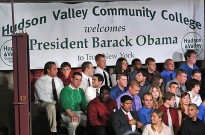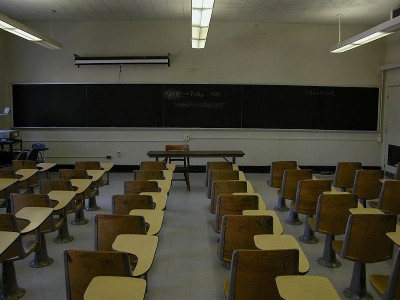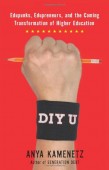Ending teacher tenure in Florida?
Looks like that’s what could happen. A key committee in the Florida House has approved a bill that will end teacher tenure, create a new statewide merit pay program, and require that half of teachers’ evaluations be based on student performance. Teachers in Florida are furious, saying good teachers will be discouraged from working in the state. According to the Associated Press, the bill has become the most hotly debated issue of this year’s legislative session and “teachers, parents and students have flooded the Capitol with calls and e-mail over the past couple weeks. Demonstrations also have been held around the state and one teacher has written a protest song.” Democrats oppose the bill. Here’s how Republicans defend it. If passed, as seems all but certain, Gov. Charlie Crist has said he would sign it.
Teachers earn tenure in every state. (Technically, tenure doesn’t mean lifetime employment. But due-process is so lengthy and expensive that few teachers ever lose their jobs for incompetence.) But, according to this Education Week story, a number of states are making it harder for teachers to earn tenure and, increasingly, student achievement gains are being factored into the decision. It will be interesting to see if Florida — which has an unusual political climate and a former governor (Jeb Bush) who remains actively involved in education policy decisions through a foundation that he helped re-establish — influences other states.
— Richard Lee Colvin
Teachers, the movie
After the death of famed calculus teacher Jaime Escalante, who was depicted in the inspirational movie Stand and Deliver, USA Today reporter Greg Toppo took a look at education movies more generally. Greg talked to James Trier, a University of North Carolina professor who studies movies and television shows about teachers. Going all the way back to Blackboard Jungle, teachers have been presented as saviors who — with some humor, tough love or other means — change the lives of their most troubled students. CNN showed no skepticism and assembled a list of 10 such cliched films in this piece.
Neither piece mentioned my favorite: Teachers, a 1984 film starring Nick Nolte, as a once-idealistic teacher who has been beaten down by booze and the inanity of the system. He’s reinspired by his students as well as JoBethWilliams, a former student-turned civil rights lawyer, who shows up to sue the district because of the poor quality of education it is delivering.
Teachers riffs on other teacher movies and includes a classic staff lunchroom scene (a humorously ironic re-creation of a similar scene in Blackboard Jungle). But what I mostly like about Teachers is the writing.
The hapless principal who, as in many other school movies hides out in his office, says: “We’re not here to worry about one kid, we’re trying to get as many through with what we’ve got.” Lots of other great quotes can be found here, on ImDb.
— Richard Lee Colvin
Lessons for the next round of Race to the Top?
For states that came away empty-handed from last week’s Race to the Top competition, there was bound to be disappointment. But now some skepticism has also emerged with the announcement that only Delaware and Tennessee would get money from the $4.35-billion grant program, beating out 14 other finalists.
The New York Times noted that “many states are questioning the criteria by which winners were chosen,” and reporting that several have yet to decide if they will reapply for the second round. So why would cash-strapped states refuse potential money at a time when they may be laying off teachers and making other unpopular budget cuts? A quote from Colorado Gov. Bill Ritter helped sum up what is happening in that state — a preference for local control: “Many tiny school districts don’t like federal mandates,” he told the Times.
The Washington Post had another take on the winners, providing insight about who will remain in the next round — when another $3 billion is available — and noting that states with plenty of teacher union support come out ahead. And others have noted that charter school caps remain an obstacle.
— Liz Willen
Rubber rooms: Coming soon to a theater near you!
A few years ago, when I was teaching at the United World College in Hong Kong, an Irish friend told me that there are thousands of teachers across the U.S. who have been accused of various “crimes” and thus removed from classrooms.
Instead of teaching, they report to “work” each day in what he called “rubber rooms,” where they spend weeks (or months, or years) waiting to be cleared and reinstated, or found guilty and cut loose. While awaiting their hearings, they receive their full salaries.
I was floored and simply couldn’t believe it. In my country? I considered the source of this information: this was the same guy who had told me that paying federal income tax in the U.S. isn’t required by law, a trillion-dollar secret that the IRS desperately doesn’t want anyone to know.
Naaaaaaah. “Rubber rooms” were as much myth as mermaids and minotaurs, I told myself.
But it turns out rubber rooms do exist, and they cost cities like New York upward of $30 million per year. The issue received renewed attention last August when The New Yorker ran a detailed piece by Steven Brill called “The Rubber Room: The Battle Over New York City’s Worst Teachers.” More recently, Jennifer Medina of The New York Times reported that the NYC Department of Education hasn’t had much success speeding up the hearing process, noting that only three teachers have been fired for incompetence in the last two years.
Rubber rooms will continue to be in the news in the coming months for at least two reasons.
First, they have come to symbolize what a growing chorus of politicians and policymakers says is awry with modern American education: outdated union contracts that afford teachers too much protection and that make systemic reform almost impossible. As teachers’ unions come under increased pressure to change how they operate, and as the movement to pay teachers based on student performance gains new momentum, lesser-known absurdities like the rubber rooms will come to light.
Second, a new documentary called The Rubber Room will make waves. A trailer of the film can be viewed here, and an advanced screening will be held at New York University on April 16, 2010. In the words of the filmmakers, The Rubber Room “asks the tough questions about ‘the room’ itself, but also relates those questions to larger trends in both New York City and national education. It closely examines the lives of teachers, students, parents and administrators; and glimpses the future of one of society’s most important institutions, that of our public education system.”
Do-it-yourself higher education
Must-listen radio: Brian Lehrer’s WNYC interview of Anya Kamenetz about her new book: DIY U.: Edupunks, Edupreneurs and the Coming Transformation of Higher Education. Kamenetz writes about tuition rising at twice the rate of inflation, productivity in higher education (which she says is a “dirty word”), and the fact that parents and students know little about the quality of education they are getting because colleges do not provide data on student outcomes. But, she says, there’s reason for optimism: it’s more possible than ever before for people to craft their own educations, via new types of institutions that give credit for previous learning, online course materials, lectures from great professors available digitally and more. Kamenetz is a provocative writer whose previous book, Generation Debt, exposed the inner workings of the student loan industry.
— Richard Lee Colvin
What college majors are expendable?
Humboldt State University, part of the California State University system and located on the state’s northern coast, needs to cut its budget. Among the programs under consideration for elimination are these: philosophy, chemistry, physics, fisheries biology and oceanography. Does every college need a philosophy department? What about chemistry? What majors should be offered at every school?
— Richard Lee Colvin
America’s “cheapest” colleges in HuffPost
Huffington Post’s “College” tab has a photo feature on a dozen “cheap” four-year colleges and graduate schools. (My good friend Louis Swayne always reminds me that “inexpensive” is a less judgmental term.) Some of the colleges, such as Cooper Union and the Curtis Institute, are expensive places that have enough endowment or philanthropic money to reduce or eliminate students’ costs. But the list does not include the growing number of three-year and other no-frills colleges, a concept that is spreading. Others include the military academies, Berea College, Deep Springs College and College of the Ozarks.
— Richard Lee Colvin
Do Advanced Placement classes make a school stronger?
The story of Stand and Deliver teacher Jaime Escalante, who died this week, had an enormous effect on the career of Jay Mathews, the longtime Washington Post reporter who writes the Class Struggle blog on the Post’s Web site.
Mathews wrote a book about Escalante and, ever since, he has extolled the benefits of rigorous Advanced Placement and International Baccalaureate classes as a way to expand educational horizons and outcomes for all students. Mathews’ advocacy is one of the forces that has brought about a significant expansion of AP nationally. He came up with the Challenge Index, which ranks high schools based on their graduation rates and participation in AP and IB classes.
At first blush, this sounds like a great thing. Parents and policymakers want students to be challenged and pushed so they can learn more. But should students who read poorly be put into classes where they are expected to read and analyze Shakespeare? The Index has been criticized because it doesn’t take into consideration how well students do on AP tests and also lauds schools with low graduation rates and large achievement gaps. Mathews responded to such critiques here.
Mathews is a reporter who likes to engage with people with a different point of view. In this column, he has a discussion with a researcher he says is “the smartest critic of AP in low-income schools.” Well-worth reading.
— Richard Lee Colvin
Texas Tea Party Standards

Don McElroy at a Tea Party meeting (Washington Post photo)
Don McElroy, the Texas state school board member who has been the most vocal proponent of new school social studies standards that many historians say are skewed to fit conservative views about Christianity and government, assured a Tea Party gathering that Washington would not take over their schools. But a small town schools superintendent in Texas interviewed by the Washington Post says he’s caught between the dictates of Washington and Austin.
— Richard Lee Colvin
What’s harder to get into than Harvard? Some overstretched community colleges
On or about April 1st, it’s impossible not to see a flurry of stories about how, once again, it’s getting harder than ever to get accepted to Harvard University and other Ivy League and elite schools. After all, those are the schools that most Americans attend, right?
Not even close, which is one reason why The Hechinger Report is heartened by the increased coverage given to community colleges in the U.S., which educate at least half of all U.S. students. The strained resources of public colleges and the financial crisis have meant more and more students are turning to their local community colleges. In addition, laid-off workers look to the schools for retraining and to start new professions.
All over California  and in many states, community colleges have had to cap or limit enrollments because they are simply out of space.
and in many states, community colleges have had to cap or limit enrollments because they are simply out of space.
So while headlines proclaim that it’s harder than ever to get into Harvard, keep in mind that getting a far cheaper, less elite education is also more elusive and can be fraught with obstacles, even as President Barack Obama is pushing degree completion.
— Liz Willen








